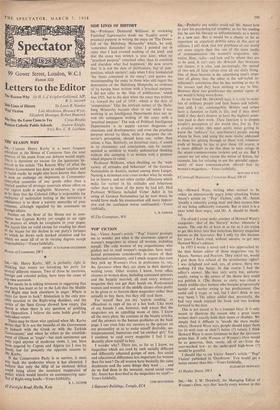SIR,—Probably any soldier could tell Mr. Anant how to cure
his psycholog;cal troubles; as for his reading list, he airs his literacy as selfconsciously as a navvy in a new suit. But it would be a shame to let so important an argument dribble away in this sort of silliness. I still think that few problems of our world are more urgent than this one of the mass media of communication—the women's magazines, tele- vision, films, radio—and how and by whom they are to be used. It isn't only the H-bomb that threatens our future; it is also, and increasingly, the spread of two sets of false values over all our daily living. One of these heresies is the advertising man's struc- ture' of glossy lies; the other is the self-styled in- tellectual's conviction that he has nothing to say to the masses and they have nothing to say to him. Between these two grindstones the mental vigour of our world is being worn down.
As my friend Mr. Drawbell says, it is easy to make fun of ordinary people and their hopes and beliefs; easy and, I say, contemptible. Writers and artists have a function to • fulfil in life, and if they don't fulfil it they don't deserve to have the, slightest atten- tion paid to their work. Their function is to deepen, people's perception of the world they live in. For a creative writer, this must surely mean getting to know the 'ordinary' (i.e. non-literary) people among whom he lives, and using the mass media addressed to them for getting through to them with whatever truth or beauty he has to give them. Of course, it is more difficult to do this than to take refuge in the senior-common-room reviews and so on. But I cannot see yet what excuse the writer of fiction, for example, has for refusing to use the splendid oppor- tunity of mass communication offered' him • by women's magazines.—Yours faithfully, HOWARD WYCE 4 Cornwall Mansions, Cremorne Road, SWl0


































 Previous page
Previous page